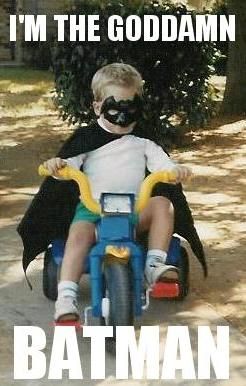[youtube http://www.youtube.com/watch?v=CxG4g62rnd8]
A few days ago, Keith Olbermann discussed the injustice of NYC Mayor Bloomberg’s response to #OWS. Among the more humorous of his remarks was this:
Who else but a publicity addict like Bloomberg could have enabled the arrest of 700 protesters on the Brooklyn Bridge and yet, two months later, frozen 20 square miles of New York City in gridlock traffic over two days, so somebody could film another GODDAMNED BATMAN movie on the 59th Street Bridge? Leading to the inescapable conclusion that — if you want to tie up a little traffic during a protest for equality and freedom from corporate domination on a bridge in New York City — you will be arrested. But — if you want to tie up all of the traffic during a goddamned movie shoot for the financial benefit of corporate domination — the city of New York will embrace you and give you tax breaks.
Now fans of Batman will recognize here more than just a tirade against GODDAMNED BATMAN movies; there’s also an allusion — perhaps a fannish, loving allusion — to words uttered by Batman himself: “I’m the goddamn Batman!” (panel 1, page 10, All Star Batman and Robin the Wonder Boy, issue 2)
This has since become a widespread Internet meme (see the Know Your Meme site for some background), as displayed in images like this:
So while Olbermann was making a serious point in his commentary on Bloomberg and GODDAMNED BATMAN movies, he was also invoking this line of humorous appropriation — or OCCUPATION — and bringing it into connection with #OWS. We might read this, then, as a call for the occupation of Batman — or, more accurately, for the politicization of the occupation represented by the “goddamn Batman” meme.
Almost as if in response, what is appropriately being called a “Bat-signal” for #OWS (created by Mark Read) was projected yesterday on the Verizon Building during the #N17 march on the Brooklyn Bridge (see the video above). (The story behind Read’s projection is quite interesting, so check out the interview with him at BoingBoing.) And while I haven’t seen anyone explicitly connecting Olbermann’s comments, the “goddamn Batman” meme, and this so-called “Bat-signal,” I think there’s something to be said for doing so, and good (i.e. strategically sound) reason for actively taking up these connections as part of the viral imagery of the #Occupy movement. #OWS itself is about reclaiming, rewriting, about techniques familiar from the medium of comics — about retcon and the proliferation of alternate universes, as these words from the Bat-signal for the 99% demonstrate:
99% / MIC CHECK! / LOOK AROUND / YOU ARE A PART / OF A GLOBAL UPRISING / WE ARE A CRY / FROM THE HEART / OF THE WORLD / WE ARE UNSTOPPABLE / ANOTHER WORLD IS POSSIBLE /…
#OCCUPY THE GODDAMN BATMAN!


